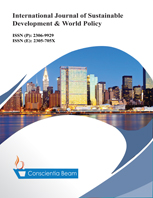Rice Farmer and Capital Formation: A Case Study of Rice Farmer's Credit Cooperative in Itoikin, Ikosi-Ejirin LCDA, Lagos State
DOI:
https://doi.org/10.18488/journal.26.2017.61.1.8Abstract
This study set out to examine capital formation among rice farmers who belong to rice farmers’ credit cooperative and to isolate factors that determined why some farmer accumulate capital more than others using Itoikin rice farmers’ cooperative society. The study draws on two sources of data namely household level surveys and secondary data to get insight about the size and composition of capital formation among rice farmers. The results showed that on average, farmers were 50 years with about 4 years of education, 6 persons in household size and about ₦73,004.37 as mean income. Capital Formation takes the form of agricultural land, rice, agricultural machinery and equipment. The results further showed that about one-quarter of the net addition to fixed capital come from household savings and the rest three-quarter are borrowed from Cooperative and other sources. Regression results indicate that the most important factors determining the level of capital formation are age, the income from rice, Loan from cooperative and other sources and farm holdings. We also found that an increase in the average education of the farmers increases agricultural capital significantly. Education of farmers/rural dwellers should be at the front burner of all rural transformation agenda.

